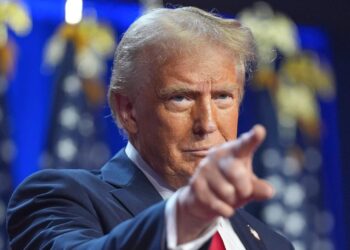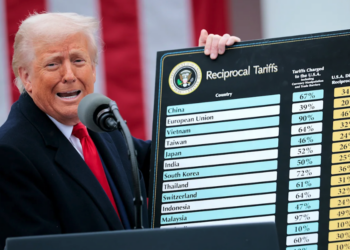The Chief Executive Officer of Ecobank Transnational Inc., Jeremy Awori, has said African countries can cushion the potential economic fallout from U.S. President Donald Trump’s new tariffs by increasing trade among themselves.
Speaking in an interview with Bloomberg TV, Awori noted that Trump’s tariffs will replace the African Growth and Opportunity Act (AGOA), which about 30 African nations have relied on to develop export-driven industries, including textiles and apparel.
In 2023, sub-Saharan Africa exported $29 billion worth of goods to the U.S., making it the region’s fourth-largest market after China, the United Arab Emirates, and India.
According to him, while the U.S. is not Africa’s biggest trading partner, the continent’s economies could still face indirect repercussions if the tariffs lead major partners like China to reduce demand for African exports.
AfCFTA as a key solution
Awori pointed out that the trade tensions reinforced the urgency for African nations to fast-track the implementation of the African Continental Free Trade Area (AfCFTA), which came into effect in October 2022.
- The World Bank estimates that the agreement could boost African exports by $560 billion. However, progress has been slow due to ongoing negotiations on critical terms.
- Intra-African trade grew by 3.2% to $192 billion in 2023, but this still accounted for only 15% of the continent’s total trade.
- Awori emphasized that beyond tariff reductions, Africa must address non-tariff barriers such as restrictive visa policies and logistical challenges faced by landlocked countries.
Economic risks and growth projections
Awori noted that the new tariffs follow Trump’s earlier decision to freeze aid to Africa, which Ecobank research suggests could push an additional six million people into extreme poverty.
Meanwhile, the African Development Bank (AfDB) had projected the continent’s economic growth to accelerate to 4.3% in 2025, up from an estimated 3.7% in 2024.
- However, this outlook is now under threat due to global trade tensions, which have rattled markets and increased recession risks in the U.S.
- The tariffs imposed on African nations vary widely, ranging from 10% for countries like Benin, Kenya, and Cape Verde to as high as 50% for Lesotho—the highest rate applied to any sovereign nation.
- Awori stressed that fully implementing AfCFTA and adding value to raw materials within Africa would help the continent retain more economic benefits, create jobs, and improve livelihoods.
“Now more than ever, African countries must focus on trading more with each other and creating a seamless framework for intra-continental commerce,” he said.
What you should know
Afreximbank Research in its impact analysis of the Trump’s tariffs, had stated that the tariffs might have a limited direct impact on African economies, given the continent’s deepening trade ties with China.
- It, however, noted that the indirect effects of ongoing U.S.-China trade tensions could pose significant risks to Africa’s commodity-dependent nations.
- Meanwhile, the Nigerian government on Sunday declared that the new U.S. trade policy would disrupt the country’s non-oil exports.
- The government noted that while oil has long dominated Nigeria’s exports to the US, non-oil products—many previously exempt under the African Growth and Opportunity Act (AGOA) now face potential disruption.
It added that the new 10% tariff on key categories may impact the competitiveness of Nigerian goods in the U.S.
























